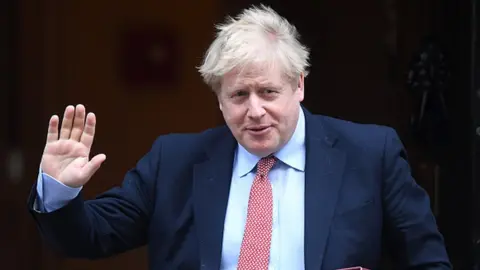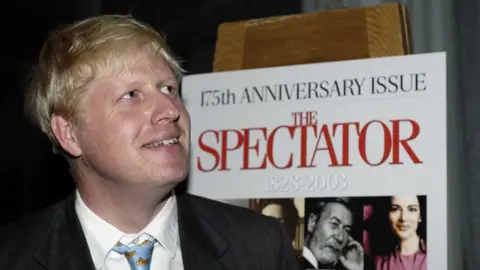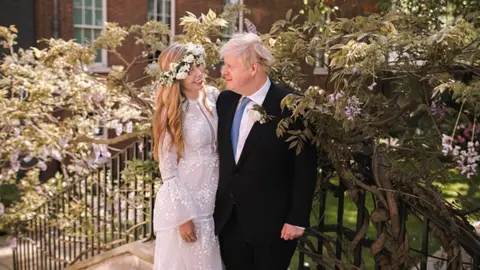Why would Boris Johnson need an £800,000 loan?
 Getty Images
Getty ImagesWhen Boris Johnson was prime minister, he was offered a loan of up to £800,000 to top up his income.
Details of the loan, and allegations the BBC's chairman, Richard Sharp, was involved in arranging it, surfaced following a report by the Sunday Times.
Mr Sharp resigned from his role after a report found he failed to disclose potential perceived conflict of interests during the appointments process.
This included that he sought to arrange a meeting between Cabinet Secretary Simon Case and Sam Blyth, a distant cousin of Mr Johnson who had offered to support the then-PM financially.
Mr Sharp insists he did not play any part in facilitating or financing the loan but conceded he should have declared his role in seeking to set up the meeting.
Mr Johnson says his financial interests have been properly declared.
But why would Mr Johnson need a loan this big in the first place?
Those who know Mr Johnson say they weren't surprised by the size of it.
One source who worked with Mr Johnson in Downing Street said the former prime minister was not an "extravagant person" but that amount of money was "not a lot" to sustain his lifestyle during his premiership.
During his time at Number 10, there was speculation Mr Johnson was short of cash to cover childcare and divorce costs, among other bills.
'Income plummeted'
When he first became prime minister, in July 2019, he claimed a total salary of £154,908, on top of other sources of income. That's far above the median UK pay packet, which was £33,000 in 2021.
There is no doubt Mr Johnson had to take a big pay cut when he gained high office, first as foreign secretary in 2016, and again when he became prime minister in 2019.
"His income plummeted," says Andrew Gimson, author of Boris Johnson: The Rise and Fall of a Troublemaker at Number 10.
"So it's not surprising that he decided the best thing to do was to borrow the money, as he expected his earning power to be large once he stopped being prime minister."
It's true that, before becoming prime minister, Mr Johnson had a lucrative career as a journalist, a public speaker and a TV personality.
One major source of income was his gig as a columnist for the Daily Telegraph newspaper. Between July 2018 and July 2019, he was paid £22,916.66 a month by the newspaper, for what he said was 10 hours' work.
Parliamentary records show he pocketed tens of thousands of pounds in fees for writing books, penning articles in publications - such as The Spectator, the political magazine he used to edit - and making speeches at events.
 PA Media
PA MediaIn total, Mr Johnson's employment and earnings added up to about £800,000 in the 2017-2019 session of Parliament.
'Properly declared'
If that figure looks familiar, it's the same value of the loan reported by the Sunday Times.
A spokesperson for Mr Johnson told the newspaper he withdrew far less than £800,000 from the loan, which was described as a credit facility.
Mr Blyth - a multimillionaire Canadian businessman and distant cousin of Mr Johnson - is reported to have raised the idea of acting as a guarantor for the loan. This means he would guarantee the money would be paid back if Mr Johnson did not meet the repayments.
Mr Johnson has not revealed who was offering to lend him the money.
But a spokesperson for the former PM said: "All Mr Johnson's financial arrangements have been properly declared and registered on the advice of officials."
As for how the money was used, the Sunday Times says the funds helped Mr Johnson finance day-to-day expenses and his lifestyle as PM.
One bill that came in during his premiership was for the refurbishment of the flat above 11 Downing Street, where he lived with his wife, Carrie Johnson, and their children.
Divorce settlement
Mr Johnson had to stump up £52,000 to reimburse a Conservative Party donor who had initially paid for a designer revamp of the Downing Street flat.
 Getty Images
Getty ImagesAdd to this a reported multi-million pound divorce settlement with his second wife Marina Wheeler, with whom he has four children, in 2020.
In the past, Mr Johnson has complained about his financial position.
When he was the mayor of London in 2009, he told the BBC his £250,000 a year salary from the Telegraph was "chicken feed", adding he made "a substantial donation to charity".
Then, in October 2017, when he was foreign secretary, the Sunday Times reported he had told a friend he was running out of money and could not afford to live on £141,505 because of his "extensive family responsibilities".
Given these financial pressures, one of Mr Johnson's former staffers said it was sensible for a sitting prime minister not to be worrying about their financial stability.
Mr Gimson echoed that view, saying "it's not new for Boris to be living or earning at a rate that most of us can only dream of".
The author said while Mr Johnson was "very keen on making large amounts of money", he was personally known to be "quite frugal".
The loan, Mr Gimson said, suggests Mr Johnson "hoped to be prime minister for a lot longer than he was".
Now he's left office, Mr Johnson is entitled to claim an allowance of up to £115,000, as all former prime ministers are.
But the Liberal Democrats say Mr Johnson should be stripped of the allowance until he answers questions about his financial arrangements while he was prime minister.
"We know he's only interested in following the money, so it's time to hit him where it hurts - his wallet," said Wendy Chamberlain, the party's chief whip.
However, his earnings since returning to the backbenches dwarf any allowance he's entitled to as an ex-PM.
Mr Johnson has already been paid more than £5.3m for speeches and articles since leaving Downing Street in September, according to the register of members interests.
